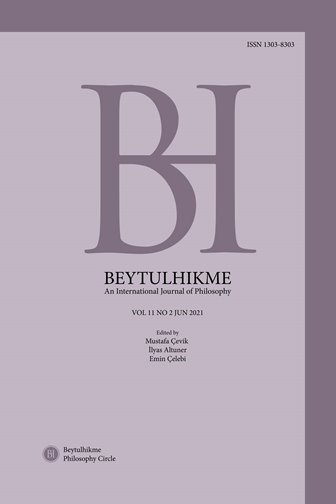Author :
Abstract
Galen’in ahlak anlayışında bir yandan Platon’un üç kısımlı ruh anlayışı, bir yandan da Hipokrat’ın mizaç teorisinin etkili olduğu söylenebilir. Bu açıdan dönemin etkili felsefi ve tıbbi geleneklerinin bir nevi terkibini sunan Galen, fizikalist psikoloji anlayışıyla ise geleneğin dışında yer almaktadır. Ruhun yetilerini bedenin mizacına tabi olarak gören Galen, ruhun sağaltımı anlamına gelen ahlak konusunda çoğunlukla determinist bir anlayış sergilemektedir. Bunun nedeni tabii ve fiziksel yapının değiştirilmesinin zor olmasıdır. Öte yandan hem bir hekim hem de “felsefi terapist” olarak adlandırabileceğimiz Galen, erken yaşta eğitim ve alışkanlık edinme ile huyların “tabiatın izin verdiği ölçüde” değiştirilebileceğini savunmaktadır. Bu makalede Galen’in huylar bağlamında insanın ahlaki değişim ve gelişimine verdiği imkân tespit edilip değerlendirilmeye çalışılacaktır.
Keywords
Abstract
It can be said that both Plato's tripartite soul and Hippocrates' theory of temperament were influential in Galen's perception of ethics. In this respect, Galen, who presents a kind of composition of the effective philosophical and medical traditions of his day, is outside the tradition with his understanding of physicalist psychology. Considering the capacities of the soul as depending on the temperament of the body, Galen generally displays a deterministic attitude towards ethics, that is, the development of the soul. This is because the natural and physical structure is difficult to change. On the other hand, Galen, whom we can call both a physician and a "philosophical therapist", argues that character traits (ethos) can be changed "to the extent that nature allows" through education and habituation at an early age. This article will try to determine and evaluate the possibility Galen ascribes to ethical change and development in humans in the context of character traits.
Keywords
- Aristotle. (2009). Nichomachean Ethics. (D. Ross, Çev.) Oxford University Press.
- Aristotle. (2011). The Eudemian Ethics. (A. Kenny, Çev.) Oxford University Press.
- Brain, P. (1977). Galen on the Ideal of the Physician. South African Medical Journal, 52(23).
- Das, A. R. (2020). Galen and the Arabic Reception of Plato's Timaeus. Cambridge: Cambridge University Press.
- Donini, P. (2008). Psychology. R. Hankinson içinde, The Cambridge Companion to Galen. Cambridge: Cambridge University Press.
- Evans, E. C. (1945). Galen the Physician as Physiognomist. Transactions Proceedings of the American Philological Association(76), 287-298.
- Galen. (1981a). Fî Enne ḳuva’n-nefs tevâbiʿ li-mizâci’l-beden. A. Bedevî içinde, Dirâsât ve nuṣûṣ fi’l-felsefe ve’l-ʿulûm ʿinde’l-ʿArab. Beyrut.
- Galen. (1981b). On the Doctrines of Hippocrates and Plato (Cilt I-V). (P. D. Lacy, Çev.) Berlin: Akademie-Verlag.
- Galen. (2014a). Avoiding Distress. P. Singer içinde, Galen: Psychological Writings (V. Nutton, Çev.). Cambridge: Cambridge University Press.
- Galen. (2014b). Character Traits. P. Singer içinde, Galen: Psychological Writings (D. Davies, Çev.). Cambridge: Cambridge University Press.
- Galen. (2014c). The Capacities of the Soul Depend on the Mixtures of the Body. P. Singer içinde, Galen: Psychological Writings (P. Singer, Çev.). Cambridge:
- Galen. (2014d). The Diagnosis and Treatment of the Affections and Errors Peculiar to Each Person's Soul. P. Singer içinde, Galen: Psychological Writings (P. Singer, Çev.). Cambridge: Cambridge University Press.
- Galen. (2018). Mixtures (De Temperamentis). (P. Singer, & P. J. Eijk, Çev.) Cambridge:
- Hankinson, J. (1993). Actions and Passions: Affection, Emotion, and Moral Self- management in Galen's Philosophical Psychology. J. Brunschwig, & M. C. Nussbaum içinde, Passions and Perceptions: Studies in Hellenistic Philosophy of Mind. Cambridge: Cambridge University Press.
- Kagan, J. (1994). Galen's Prophecy: Temperament in Human Nature. New York: Basic Books.
- Özturan, H. (2020). Ethostan Ahlaka: Antik Yunan Ahlak Literatürünün İslam Dünyasına İntikali ve Alımlanışı. İstanbul: Klasik Yayınları.
- Singer, P. (2014). Galen: Psychological Writings. Cambridge: Cambridge University Press. Öz: Galen’in ahlak anlayışında bir yandan Platon’un üç kısımlı ruh anlayışı, bir yandan da Hipokrat’ın mizaç teorisinin etkili olduğu söylenebilir. Bu açıdan dönemin etkili felsefi ve tıbbi geleneklerinin bir nevi terkibini sunan Galen, fizikalist psikoloji anlayışıyla ise geleneğin dışında yer almaktadır. Ruhun yetilerini bedenin mizacına tabi olarak gören Galen, ruhun sağaltımı anlamına gelen ahlak konusunda çoğunlukla determinist bir anlayış sergilemektedir. Bunun nedeni tabii ve fiziksel yapının değiştirilmesinin zor olmasıdır. Öte yandan hem bir hekim hem de “felsefi terapist” olarak adlandırabileceğimiz Galen, erken yaşta eğitim ve alışkanlık edinme ile huyların “tabiatın izin verdiği ölçüde” değiştirilebileceğini savunmaktadır. Bu makalede Galen’in huylar bağlamında insanın ahlaki değişim ve gelişimine verdiği imkân tespit edilip değerlendirilmeye çalışılacaktır. Anahtar Kelimeler: Galen, ruhun kısımları, ahlak, huy, tabiat.
